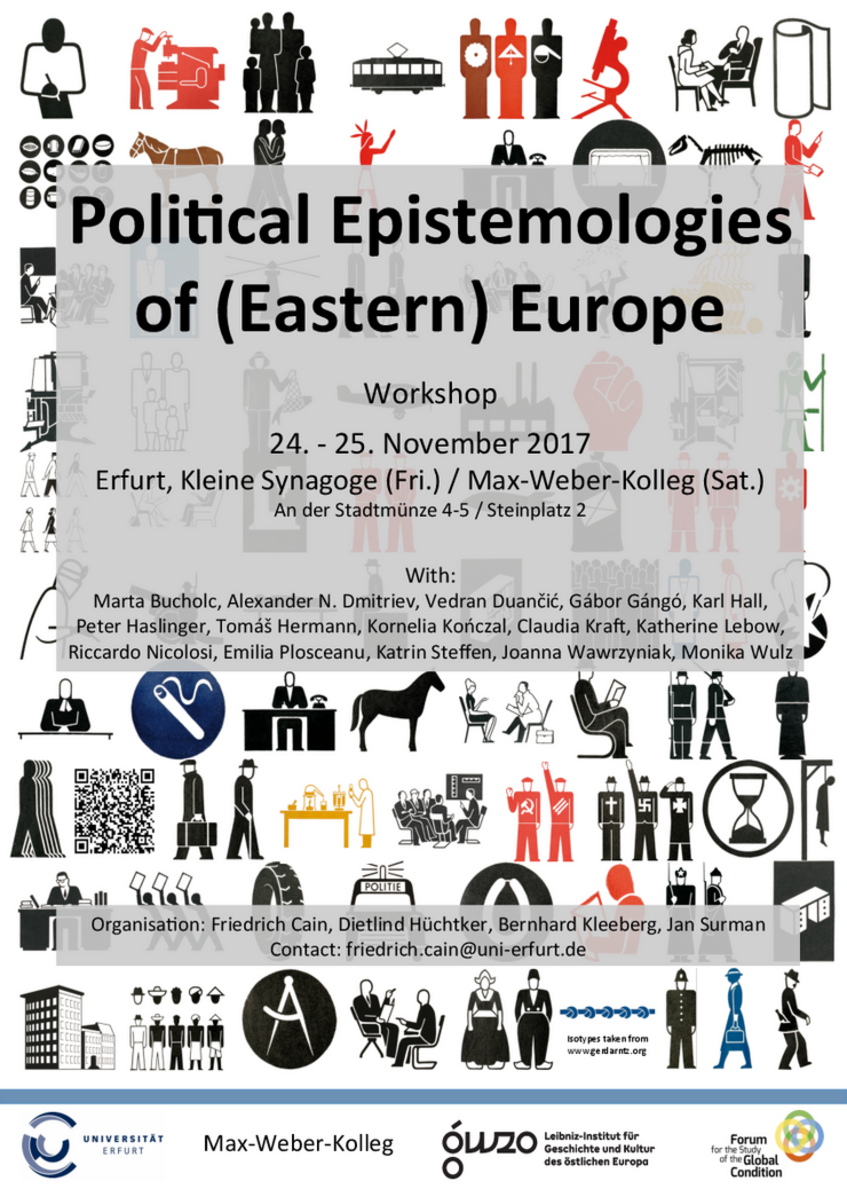
Political Epistemologies of (Eastern) Europe
Erfurt, 24-25 November 2017
Venue: Max Weber Center/Univ. of Erfurt, 24-25 Nov. 2017
Organisers: Friedrich Cain, Bernhard Kleeberg, Dietlind Hüchtker, Jan Surman
Funded by: Forum for the Study of the Global Condition /// Max Weber Center for Advanced Cultural and Social Studies, University of Erfurt
Contact: Friedrich Cain
Contributors: Marta Bucholc, Alexander N. Dmitriev, Vedran Duančić, Gábor Gángó, Karl Hall, Peter Haslinger, Tomáš Hermann, Kornelia Kończal, Claudia Kraft, Katherine Lebow, Riccardo Nicolosi, Emilia Plosceanu, Katrin Steffen, Joanna Wawrzyniak, Monika Wulz
Programme | Report | Publication
The first half of the 20th century was an age of global accelerated social and political transformation, at the time and afterwards conceived as either evolution, revolution, or reform. While the entity of Eastern, Central and South-Eastern Europe was heterogeneous, it was home to a number of parallel processes inducing what seem to be similar epistemologies, varying only in local forms. To localize these variations, our workshop focused on reflections on science, scholarship and higher education done in this region from the end of WWI until the 1960s.
The scholars we focused on were not only “scientists of science”, but often analyzed and even heavily influenced political and social change from their specific standpoints, ranging from philosophy, history, sociology, psychology to especially pedagogy. However, most of them positioned their projects at transdisciplinary junctures. They were eager to introduce brand new sciences or at least to fundamentally reshape existing disciplines. Many politically engaged scholars suggested and helped to implement programs to investigate science, thought or creativity in order to foster individual, social or national progress. We understand such projects as political epistemologies – theories of knowledge, that are preconditioned by political convictions. In times of national and cultural plurality – either multiplication or fragmentation – these theories often emphasized a plurality of knowledge.
Our workshop aimed to investigate such political epistemologies in their respective academic, regional or national embedding. The workshop had two main interests: First, to uncover the panorama of contributors that goes beyond such prominent figures like Alfred Tarski or Ludwik Fleck in Warsaw and Lviv, Jan Patočka and Emmanuel Rádl in Prague, Boris Hessen and Aleksander Bogdanov in Moscow and St. Petersburg or Karl Mannheim and Michael Polanyi, both born and socialized in Budapest. For this we particularly encouraged contributions on persons and places hitherto marginalized in recent research. Second, we wanted to investigate different theoretical concepts and practical methods that originated in the region and uncover biographies of these concepts and methods, whether local or transnational.
